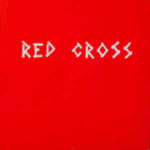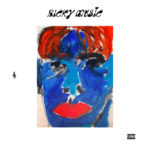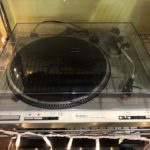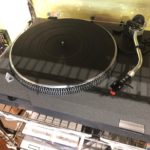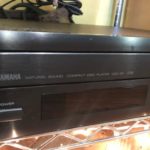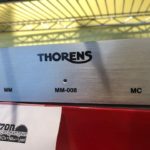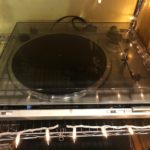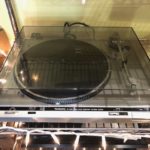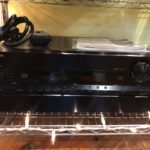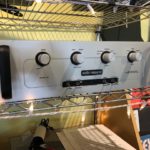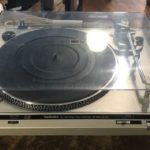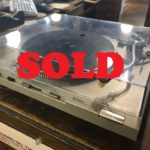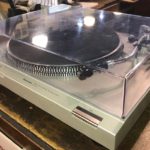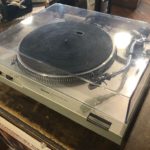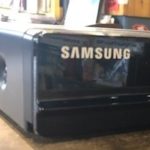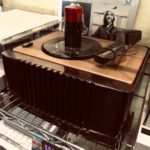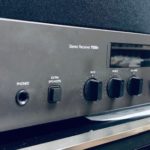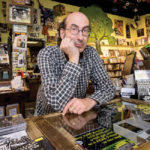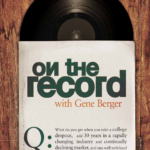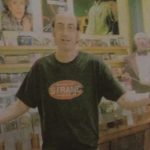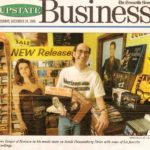WAXAHATCHEE, Great Thunder (CD/LP)
A sad record isn’t always the easiest to get into, but that tends to be from just how emotionally visceral they are. While it’s not the most complex release from Waxahatchee in recent memory, there’s so much packed in to her words that it wildly overshadows what any additional instrumentation could offer. If you can be in the right headspace to take it in, this album will take you for a ride. In the slow piano crawl of “Singers No Star” Katie Crutchfield explores just as much of the low-end of her voice as she does strange pop tropes. All the while it’s her ability to weave this into something emotionally broken and worn-out that makes it memorable and intense to hear. Ultimately without any major switches or drum intro, the track ends up as more of a thematic intro but one that really packs a punch. By keeping listeners on their toes and being utterly honest lyrically, Waxahatchee gets you set for something introspective. This makes “You’re Welcome” a lot more interesting to take in, even as it feels like Crutchfield is delivering the song to family and friends in the middle of dinner. Speaking of “Ancient mistakes that linger” and living by words “That a stranger overheard” there’s a sense that Waxahatchee is not only haunted by her past but trying learn how to not repeat herself. By the end of the track however, it appears that no one has listened, and that ultimately it’s up to Crutchfield to fight for herself. Though it starts out the most stripped-down, “Chapel Of Pines” slow-burns its demands to let the arrangements drip in with each verse. There’s such a desperation to the vocals Waxahatchee brings that all the little harmonies come off as more of an extension of just how drained she’s become. Even while the hum of a bass-heavy keyboard sinks in and it sounds like someone is starting to thump lightly on a drum, Crutchfield steps away to let the music speak for itself. The simple piano lines of “You Left Me With An Ocean” don’t leave much to intrigue listeners, leaving you to hone in on the sense of disdain that Crutchfield is feeling. Quiet string touches provide a compliment to the equally light harmonies as its clear Waxahatchee is trying to communicate an extreme emotion with no energy left to do so at full force. The emotional appropriateness of these compositional choices are a strong move, although they may leave the song forgettable without the right headspace. “Slow You Down” takes away much of even the melodic charm of the rest of the record, while the harmonies shine so brightly that it starts to feel like Crutchfield is moving on. Each couple bars brings in a new keyboard, guitar or bit of percussion, layering in excitement as it moves. Strangely with all the makings of a lyric-driven interlude, the song is one of the more emotionally deep moments of the album and one that feels inspiring and thoughtful, even enough to make a solo feel appropriate. “Take So Much” oddly feels stagnant from an instrumental perspective with its pianos borderline repeating progressions from the record. If you can bear this repetition, Waxahatchee delivers in the vocal performances and lyrics, as she demands that her loved one unload on her just as hard as she tears into them. More than any track on the record, this song sees Katie Crutchfield reflecting her devastated feelings in the vocals, as it sounds like she’s about to break out crying mid chorus.
PAUL MCCARTNEY, Egypt Station (CD/LP)
When you’ve done enough in music to ensure your name defines the rock’n’roll era and will be mentioned alongside Mozart and Beethoven by the people of 2518, you have three standard late-career options. You could bow out reliving former glories as a reminder of your monumental achievements. You could chase the zeitgeist, working with the hottest young talent to try to recapture your cutting edge. Or you could slouch off into trad rock, playing out your days in the Blues Jam Retirement Home For Idea Drained Duffers. On his 17th solo album, Egypt Station, Macca tries all three on for size. It’s a theme unravelled on the tracks that throw back to his prime eras, where Egypt Station’s real magic lies. “Happy with You” has him declaring “I used to get stoned, I liked to get wasted, but these days I don’t because I’m happy with you”, from within a gorgeous pastoral flutter of flutes, toe taps and arpeggios that should really have been called “Mother Nature’s Grandad”. “Confidante”, an open letter to an ex-soulmate, recalls the proggier folk bits of 1970s Macca, while “I Don’t Know” and “Dominoes” revisit Wings’ plusher mid-Seventies arrangements. Invoking fresh flower power, “People Want Peace” seamlessly fuses “Magical Mystery Tour”, “Eleanor Rigby” and Lennon’s “Give Peace a Chance”, and Mother Mary would undoubtedly approve of “Hand in Hand”, panpipe solo and all. Most heartening of all, though, is the seafaring remake of “Band on the Run” that is “Despite Repeated Warnings”. Opening as a classic “Live and Let Die” piano refrain telling the story of a deranged captain steering their ship towards disaster despite the crew’s desperate pleas, it ramps up the drama over tense, shifting 10cc and ELO segments before the line “it’s the will of the people” reveals its hand as a Brexit metaphor. So many records as reflective and evocative as Egypt Station prove to be career codas. Despite occasional misfires this one proves that, at 76, McCartney, socially and sonically, still has plenty to say.
PAUL SIMON, In The Blue Light (CD/LP)
As he prepares to mark his retirement from touring with a show in his native Queens, New York, later this month, 76-year-old Paul Simon’s 14th solo album revisits 10 songs from his vast catalogue that he felt were “almost right, or overlooked”, and gives them a treatment he compares to “a new coat of paint on the walls of an old family home”. Other artists such as Kate Bush and Peter Gabriel have tried this approach, and Simon certainly brings his best to it. The stellar band includes jazz trumpeter Wynton Marsalis and guitarist Bill Frissell. Chamber ensemble yMusic’s inventive treatments of Can’t Run But (from The Rhythm of the Saints album) and the sublime René and Georgette Magritte With Their Dog After the War (originally on Hearts and Bones) are familiar from Simon’s current Homeward Bound tour. The former song has been updated, so that Simon now hears a DJ whose “sub bass feels like an earthquake”. There are four selections from the 2000 album You’re the One, which Simon presumably feels is his most overlooked. There are no hits and nothing from Graceland. Generally, sparser arrangements allow more space for Simon’s dazzling imagery and oblique but relevant ruminations on subjects including immigration (René and Georgette …; The Teacher), domestic violence (a bluesier One Man’s Ceiling Is Another Man’s Floor) and the state of humanity and the planet (Questions for the Angels). The Orwellian satire Pigs, Sheep and Wolves is now jazzier. Marsalis’s woozy sax in How the Heart Approaches What It Yearns wonderfully recreates the atmosphere of the “downtown [formerly ‘local’] bar and grill”. There is often a reflective, wistful feel, but Simon’s best reworkings benefit from his age and increased experience. The 1975 song Some Folks’ Lives Roll Easy is much more poignant, as he brings his septuagenarian voice to the words: “Here I am, Lord, I’m knocking on your place of business, but I have no business here.” Simon doesn’t sound at peace with the post-crash, Trump-era world at all, and the exquisite new arrangement of Love emphasises lines such as: “When evil walks the planet, love is crushed like clay.” But perhaps he can now be content with an extraordinary canon.
ERIC BACHMANN, No Recover (CD/LP)|
Eric Bachmann’s role as leader of underground alt-rock kings Archers of Loaf and barroom balladeers Crooked Fingers is, it seems, firmly in the past. More recently as a regular collaborator with Neko Case and as a solo artist he’s committed to a notably more expansive sound and more accessible tone. Here on his fourth solo outing Bachmann offers a suite of songs that benefit from the rough-hewn power of his vocal, tender arpeggiated guitar lines and gentle lifts of electronica. It’s certainly low-key but on songs like the ’70s radio-friendly “Daylight” and the title track we get snapshots of hard, sad situations as vivid as a Polaroid. “Wild Azalea” wouldn’t be out of place as a standout ballad on a recent Bruce Springsteen record while “Boom and Shake” offers a brief, brutal vision of an ecological apocalypse that’s hard to shake off. Soft, ragged, and bruised, Bachmann will always deal in the losing situations of life but seems to have conjured some rays of light here that make those moments seem more livable.
ST. PAUL & THE BROKEN BONES, Young Sick Camellia (CD/LP)
When St. Paul & The Broken Bones first broke out a few years back, singer Paul Janeway sounded like a vein-popping retro-soul powerhouse in search of a volume knob. But the Alabama band has matured and modulated ever since, with Janeway leading the way: He can, and does, still belt to the rafters, but he’s also learned when and how to dial it back and let a song groove and glide. On Young Sick Camellia, that’s allowed St. Paul & The Broken Bones to branch out well beyond old-school soul and into sleek summertime funk, with more than a few glimmers of straight-up disco. (Seriously, don’t be surprised if “GotItBad” gets the Bee Gees’ “Night Fever” stuck in your head.) Which means, in turn, that Janeway gets to show off his falsetto, while the band around him — aided by hot R&B and hip-hop producer Jack Splash — indulges its nimble, playful side. But Young Sick Camellia also has an exploratory feel, both in its sound and in its subject matter. Framed by warm and sometimes melancholy interludes in which Janeway’s grandfather discusses local weather events (and another in which his Janeway and his grandfather discuss mortality and family loyalty), the album feels lived-in and personal — a detour from 2016’s more message-driven Sea of Noise. These songs frequently grapple with Janeway’s family legacy, most notably in the way three generations of men interact with each other and the state that helped shape them. (The camellia, referenced in the album’s title, is Alabama’s state flower.) Along the way, Young Sick Camellia also ventures down trippy and unpredictable side roads like “Mr. Invisible,” in which Janeway frets about werewolves over a dense array of smudged-up samples. So anyone who might have written off St. Paul & The Broken Bones as a mere throwback ought to settle in and marinate in a sound that keeps getting weirder, more inventive and, in danceable ringers like “Apollo,” more committed than ever to the pleasures of sprightly, joyous funk
JEFF THE BROTHERHOOD, Magick Songs (CD/LP)
For most indie-rock bands, signing to a major label hardly presents the moral quandary it did, say, 25 years ago. In fact, these days, you barely even notice when it happens. (“I’m so bummed the War on Drugs signed to Atlantic,” said no one ever.) However, the destabilizing effects of getting dropped by a major label are as acute as they ever were. Back in the 1990s, even the most hardened and savvy indie-rock insurrectionists—be it the Jesus Lizard or Archers of Loaf—were never really the same after they got demoted from the big leagues. And in the more recent case of JEFF the Brotherhood, even an act that openly celebrated its dismissal from a major label can’t help but emerge from the experience a changed band. For brothers-in-rock Jake and Jamin Orrall, signing to Warner Bros. in 2012 seemed like the natural next-level move after a prolific decade-long run that saw them harness their distortion-caked racket into radio-ready power pop. Alas, their warm ‘n’ fuzzy Warner debut, Hypnotic Nights, barely cracked the Billboard Top 200, proving that a Dan Auerbach production credit isn’t enough to turn your band into the next Black Keys. With 2015’s Wasted on the Dream, JEFF the Brotherhood took another crack at selling themselves as the world’s most sanguine stoner-rock band, but Warner opted to drop the Bros mere weeks before the album was set to be released. Since then, JEFF the Brotherhood have seemingly been torn between going back to garage-greased brass tacks (2016’s Zone) or stepping more forcefully on the motorik gas pedal (2015’s Global Chakra Rhythms). But with Magick Songs, we feel the true aftershocks of their ill-fated Warner experience. Having made a concerted effort to court the mainstream only to have their advances rebuffed, the Orralls have come to the conclusion that there’s really no reason for JEFF the Brotherhood to sound anything like JEFF the Brotherhood anymore. It’s a rare thing for a rock band to genuinely surprise you on its 13th album, so credit the group—a two-piece outfit that once limited itself to three-string guitars—for completely blowing up any pre-existing notions you may have had of their band or their music. Many of these tracks are actually edits of extended jams, but Magick Songs is more than just a series of experiments in globe-trotting psychedelia. With the Pavementine rumble of “Camel Swallowed Whole” and the misty, cymbal-tapped post-rock surges of “Parachute,” JEFF the Brotherhood successfully indulge their growing fetish for off-kilter sonics while producing effortlessly tuneful, emotionally resonant songs.
WILLIAM ELLIOTT WHITMORE, Kilonova (CD/LP)
William Elliott Whitmore has been performing and making albums since the turn of the millennium, always faithful to his own idea of what makes a song that sticks. He writes songs that are simple and devastating. His voice, as it did even when he was in his 20s, sounds not just older than his years, but as though it comes from a different century. Kilonova is an album of cover songs, a common mid-career choice for commercial artists. The only thing more dire is every artist’s inevitable Christmas record. But while Whitmore plays music for a living, his music has always seemed like an act of defiance to the calculated products of the music business. Kilonova is no exception. While most of these songs were commercial hits in the past — Johnny Cash’s songs “Busted” and “Five Feet High and Rising,” especially — Whitmore strips away studio artifice and presents the songs that he grew up listening to in his gravelly raw baritone, with no more support than is absolutely necessary. The original version of album opener, the Magnetic Fields’ “Fear of Trains,” is dense and low-fi, with drum machine beats and synth bass. As Whitmore takes it on with just his voice and guitar, it foregrounds the devastating lyrics and adds a hint of country twang. It’s arguably the definitive version of the song, bringing the story of a Blackfoot Indian woman’s hard life into sharp focus. “Ain’t No Sunshine” has some of Bill Withers’ soul but Whitmore’s voice is rough where Withers’ is smooth. The next song on the album, Red Meat’s “One Glass At A Time,” seems to rhyme with “Sunshine” — both songs are about yearning for an absent lover. Whitmore’s version is emotionally desolate in the great country tradition. The album closer, “Bat Chain Puller” by Captain Beefheart, seems at first the odd song out in this collection — but it fits brilliantly. Whitmore sounds like Captain Beefheart, but takes the song into droney, krautrock territory. The original is wonky and jerky, Whitmore’s is groovy and meditative, even as he finds his harshest vocal tone to deliver Beefheart’s surreal tale of cruelty to animals. And it contains a lyrical wormhole back to the album opener “Fear of Trains”: “This train with grey tubes that houses people’s thoughts.” Paradoxically, Kilonova may be more personal than Whitmore’s albums of original songs. This collection is William Elliott Whitmore exposing his musical foundations for all to see. Each song is delivered with obvious affection, but it’s more than homage: it finds something new and unexpected in well-worn classics.
ERIC LINDELL, Revolution In Your Heart (CD)
Originally from San Mateo, California, Lindell soaked up blues in San Francisco and built up a following fronting his own blues band. He drifted to New York before meeting his wife-to-be, who wanted to get back to her family in New Orleans, relocating there in 1999. He released several records on his own Sparco label before debuting on Alligator with 2006’s Change in the Weather. Back in 2007, just after the release of Change in the Weather and before Low on Cash, Rich in Love came out, Lindell said he wasn’t big on guitar-slinging stuff, but wanted to hear harmonica and B3 and sax as well. But he’s slingin’ it pretty good on this outing, playing his Tele as well as a Gibson ES 335 12-string, and contributing B-3, bass, harp, acoustic guitar and synth. His only other accompanist is percussionist Willie McMains. Lindell lays out some sound advice on the title cut, trying to live up to what his grandpa taught him: not to speak ill of others. “I may fall short sometime,” Lindell confesses, “But I know I got to do my part / start a revolution in your heart.” Lindell’s style is laid back, but his laconic delivery gets his point across, easing it in and poking it around till it gets your attention. “Heavy Heart” sounds like Tyrone Davis’ late ’70s mellow soul on “Turn Back Hands of Time” and “Turning Point,” but there’s an added attraction with the second line undercurrent stuttering along underneath. His guitar adds another dimension, tossing in electric country blues breaks that somehow mesh smoothly with his weathered soul vocals. He’s most country on “Appaloosa,” a strange mix of Waylon Jennings-style guitar leading a second line trail ride on a moonlight jaunt to Bogalusa see his beloved once again.“Millie Kaye” brings in longtime McClinton keyboardist Kevin McKendree to play piano flourishes on the King Johnson-sounding twangfest. Lindell’s soulful strut can be found at the crossroads where Louisiana, Mississippi, Texas, and Chicago collide for a devilish run through the countryside that’ll leave you breathless, but still hot to to trot.
CLUTCH, Book Of Bad Decisions (CD/LP)
GASLIGHT ANTHEM, Sink Or Swim (CD/LP)
SPIRITUALIZED, Nothing Hurt (CD/LP)
CRAIG ARMSTRONG, Sun On You (CD/LP)
JEAN-GUIHEN QUEYRAS, Vivaldi: Songs For Cello & Basso Continuo (CD)
ESCAPE-ISM, Lost Record (CD/LP)
BLACK JOE LEWIS, The Difference Between Me & You (CD)
KILLER REISSUE:
LED ZEPPELIN, The Song Remains The Same (2XCD/4xLP)
Zep unleashes their monster 1976 live set on Jimmy-Page-remastered CD and 180g LP, along with a 28-page book with band photos and an essay by Cameron Crowe. And there’s schwag! Get a limited-edition print, poster or turntable mat with purchase!
COMING SOON:
BAND OF HEATHENS, Message From The People Revisited (9/14)
WILLIE NELSON, My Way (9/14)
ANN WILSON, Immortal (9/14)
And don’t forget these STILL-NEW platters that matter!
IRON & WINE, Weed Garden (CD/LP)
For fans of Iron & Wine, it’s Christmas in August. “Weed Garden” is a six-track EP including songs written by Sam Beam mostly while working toward his last full album, “Beast Epic,” and they sound very much like it. “Beast Epic,” released a year ago, marked not just Beam’s return to Sub Pop, but also to a more uncluttered style. While still backed by a full band, both the EP and its predecessor benefit from a regained intimacy which boosts the directness of Beam’s vocals and his bandmates’ harmonies. On opener “What Hurts Worse,” there are attempts to reconcile the idealistic aspects of a relationship with what’s actually achievable before it all crumbles, while “Last of Your Rock ‘n’ Roll Heroes” has a vibe like Tim Hardin fronting Stephen Stills’ Manassas and a disheveled, rickety protagonist who’s searching and struggling but also learning a life lesson every day. Beam’s surprise gift is the exquisite “Waves of Galveston,” a fan favorite getting its first official release. Its very 70’s-sounding refrain caresses the eardrums and Nick Drake may have sounded like this if singing about Texas. There are plenty of references to nature — the sea, butterflies, serpents, rain, clouds, flowers, winds and waves — but it’s all related to the human experience and the final three songs sustain the theme. Especially affecting are the gorgeous “Autumn Town Leaves” and the increasingly intense and desperate closer “Talking to Fog.” “Weed Garden” is both a wonderful bonus in relation to “Beast Epic” and an enchanting collection that deserves to be valued for its own plentiful merits.
DAVID OLNEY, This Side Or The Other (CD)
Veteran singer-songwriter David Olney takes a poetic look at the darkness inevitably surrounding the current immigration crisis, pleading for open hearts and mercy in the process. It’s not quite a themed album but, for the most part, it reads that way. “I wanted to explore the idea of walls,” says Olney,” What does a wall mean? What does it mean to be an immigrant who comes upon that wall as a wanderer, someone lost and alone?” Olney’s point of view is inferred from the songs as he takes the third person approach. “I’m not comfortable writing abut my own dirty laundry. It’s better for me to look at characters and what they might be going through. When I write about the heavy stuff of life, it’s usually while I’m in someone else’s shoes.” On This Side or the Other Olney teams with label owner, Juno-Award winning producer and multi-instrumentalist Steve Dawson who splits his time between his home in Vancouver and Nashville these days. Olney is one of the pillars of Americana, a songwriters’ songwriter, who can attract the best session players. Joining him are Country Music Hall of Fame harmonicist Charlie McCoy, singer-songwriter Anne McCue, The McCrary Sisters, Fats Kaplin, Dawson, and his regular band: Daniel Seymour on bass, Ward Stout on fiddle, and Justin Amaral on drums. These ten songs are both fresh and taken from old writings. Olney also collaborates with friends, co-writing three with John Hadley, penning the title track with both Hadley and McCue, and one with Abbie Gardner. He also takes a marvelous reading of The Zombies’ “She’s Not There.” Olney was thinking of Johnny Cash, the eternal outsider, for the opener “Always a Stranger,” colored by Stout’s fiddle and McCoy’s full-bodied enveloping harmonica tone. The tone gets dark and bluesy for “Wall” as Olney rather existentially raises the symbolism of a wall which is necessary for a door which, in turn, is necessary for a lock, which in turn, is necessary for a key. He summarizes so succinctly in the last verse – “Brick by brick, stone by stone/You build a wall and then it’s done/Fear by fear, doubt by doubt/You keep me in you keep me out.” He takes a metaphorical look at borders in “Border Town,” featuring the McCrarys on background vocals and Dawson on the hybrid string instrument, the mandotar. Two songs about spies come with spooky backdrops. McCue’s voice is the perfect complement on “I Spy” while “Running From Love,” an older song gets a more upbeat treatment with McCoy, Stout, and Dawson adding crisp solos. The title track takes its idea from the film about Boston gangsters, “The Town,” with Dawson on pedal steel and McCue again singing angelically. “Death Will Not Divide Us,” written with Gardner, has biblical references and the McCrary Sisters bringing the gospel feel, as Dawson delivers an inspired guitar solo. “Open Your Heart (And Let Me In) is a melodic love song, apart from the prevailing theme again featuring McCue. “Stand Tall” is one that Olney’s been working with for years, a stoic statement that invokes migrant workers, miners, troubadours and prisoners. Lines like these “here they teach you while you’re young/There’s a price you have to pay for being real/ You have to learn to walk away/To close your heart pretending you don’t, feel/But you know you feel” give us reassurance that Olney’s going to be strong and be a comforting voice. Olney likens “She’ Not There” to a magic trick. You’re looking for her and she somehow disappears.We can just as easily call this pairing of Olney with Dawson and these musicians magical too. Words can be a powerful force. In the hands of master wordsmith Olney, they can work wonders.
MOGWAI, Kin (CD/LP)
Since the mid-2000s, Mogwai have provided the musical accompaniment for one television series, Les Revenants, and a clutch of documentaries. Among those docs, their soundtracks for Zidane: A 21st Century Portrait (2006) and Atomic (2016) have felt the closest in character to the band’s regular work, and they even toured in support of the latter. KIN comes even closer to the composition of a Mogwai studio album, to the point where the line between the two is starting to blur. “We’re Not Done (End Title)” is the most striking example of this breakdown in difference; a storming tune in a similar vein to “Teenage Exorcists” but even more catchy and upbeat, with frontman Stuart Braithwaite using one of his occasional opportunities at the mic to sing verses and choruses about holding back fear and fighting against the past, which one would imagine relate at least vaguely to the plot of the movie. This kind of deep-in-the-career turn toward the accessible is still not the usual for Mogwai, but it is becoming less of a rarity. The eight tracks that come before that parting shot offer more in the way of space, tension and texture, as befits music that is meant to accompany cinematic action, but as a stand-alone album KIN stands up well from start to finish. The shifting atmospheres and swirling build-ups of “Donuts,” “Guns Down” and the title track in particular are worthy of being put center stage, and could easily become live favorites. Same goes for the deep, heavy-footed “Flee.” KIN is the uncommon soundtrack that doesn’t require any context other than its own to command more than passive attention.
AARON LEE TASJAN, Karma For Cheap (CD)
Karma for Cheap is Aaron Lee Tasjan’s sophomore release for New West following 2016’s acclaimed Silver Tears. While that one had just enough twang to barely qualify it as an Americana album, this one jingles and jangles fully with power pop. It’s just his third solo effort, but he has widely varied experience as a sideman, playing guitar in the modern day New York Dolls, the inventive Semi Precious Weapons, the Neil Young-signed Everest, British roots rock band Alberta Cross, Southern rock band Drivin’ N’ Cryin’, or even as front man of the rockers Madison Square Gardeners. Clearly, this informs his mix of psychedelic-pop and rock ‘n’ roll. Some have described his range as extending from Brian Wilson to Todd Snider with hints of Tom Petty (Traveling Wiburys version). Even the opening riffs to “If Not Now When” evoke the Beatles psychedelic period. That’s not by accident either. You could even read into the title a reference to John Lennon’s Instant Karma. As the album unfolds more British pop influences emerge as do the vocal harmonies that hearken back to previous eras too. Throw in a dash of Bowie for glam rock and it’s a mashup of vintage sounds with his own psychedelic twist. “the sound of the new record is a little more rough and ready, more raw than anything I’ve done before,” says Tasjan, continuing, “…There are a lot of people out there carrying the burden of this weird, twisted world we ‘re living in at the moment on their shoulders. So I tried to write a record that offers some comfort, encouragement and hope to those people, as much as it’s possible to be hopeful right now.” These ten songs are all originals and the album is co-produced by Tasjan, Jeff Trott (Sheryl Crow), and Gregory Lattimer (Albert Hammond Jr.). It features Tasjan’s road band – guitarist Brian Wright, bassist Tommy Scifres, and drummer Seth Earnest. Sheryl Crow is aboard for background vocals. Tasjan considers himself an experimentalist and prides himself on not being obvious. He does get to the heart of rather disguise theme immediately in “If Not Now When” with this verse – “All of your friends are asleep/And you can’t buy karma for cheap/And the cards say, ‘Read em’ and weep’.” Optimism, Tasjan style comes in verses like this from “The Truth Is So hard to Believe” – “It’s all in your head/There’s no race to be won/The world that you’re in /Is a beautiful one/With the sun in your eyes/Through the golden haze/You’re doing alright in so many ways.” The shiny, gleaming music is as uplifting as the lyrics. Amidst the mostly up-tempo, bubbly tunes is the crooning ballad “Dream Dreamer,” seemingly inspired by Roy Orbison as Tasjan sings in the high register. This is not to say he loses any momentum in the second half of the album: it’s as good, maybe even a tad better than the first half. In Echoes of Neil Diamond appear in “Set You Free” and “Strange Shadows,” “Crawling At Your Feet” and the closer “Songbird” are just terrific melodic, hook-laden pop songs. This is all perfect radio friendly fare. Pop the disc in your player and you’ll be smiling and perhaps thinking back to less stressful times.
ALKALINE TRIO, Is This Thing Cursed (CD)
It’s been five years since Alkaline Trio’s last studio album, and a lot has happened — a celebrity became president, a conman faked a music festival in the Bahamas and vocalist Matt Skiba replaced one of Blink-182 founding singers. These topics and more are dealt with on Alkaline Trio’s latest release Is This Thing Cursed?, where the punk rockers return to scornful form with a vengeance. The Chicago band was in the middle of America’s current political turmoil when penning the song “I Can’t Believe” about Donald Trump’s infamous Access Hollywood tape, and Skiba himself almost flew to play Fyre Fest with Blink-182 when the festival was outed as fraudulent; he wrote “Goodbye Fire Island” about not only that, but also as a call to action for environmentalism in underdeveloped countries. The album’s second single and eponymous track is a standout, as Alkaline Trio do what they do best: tackle serious subjects (in this case, depression) with zealous, head-banging fervour. Fans just finding Alkaline Trio, perhaps via Blink-182 fandom, will undoubtedly enjoy this album for its prevalent, socially conscious lyrics, delivered like a paintball to an already bruised arm with the band’s signature passion. Longtime devotees, meanwhile, will appreciate the way Is This Thing Cursed? calls back to earlier Alkaline Trio albums, and its mix of both nostalgia and originality. It’s a punch to the gut you didn’t know you needed.
DARBY WILCOX & THE PEEP SHOW, 11:11 (CD/LP)
AMOS LEE, My New Moon (CD)
ALICE COOPER, Paranormal: An Evening At The Olympia Paris (CD)
ATLAS ROAD CREW, Chasing Fire (CD)
DONNIE FRITTS, A Tribute To Arthur Alexander (CD)
BOB JAMES, Espresso (CD)
TASH SULTANA, Flow State (CD/LP)
KIM KASHKASHIAN, J.S. Bach: The Six Cello Suites (CD)
HOWARD SHELLEY, Classical Piano Concerto #5 (CD)
DENIS VARJON, De La Nuit (CD)














